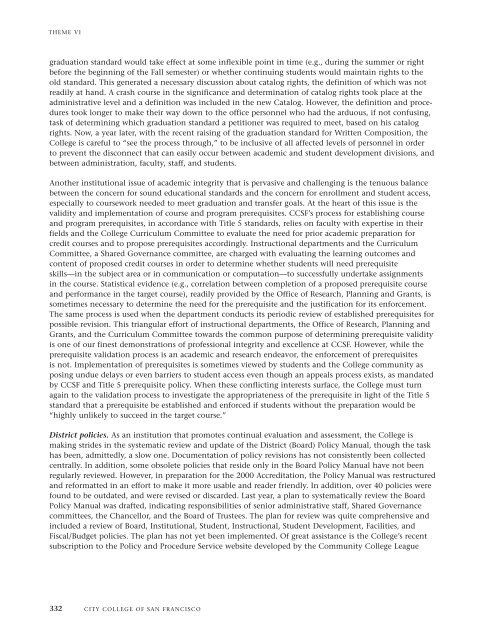City College of San Francisco - California Competes
City College of San Francisco - California Competes
City College of San Francisco - California Competes
You also want an ePaper? Increase the reach of your titles
YUMPU automatically turns print PDFs into web optimized ePapers that Google loves.
THEME VI<br />
graduation standard would take effect at some inflexible point in time (e.g., during the summer or right<br />
before the beginning <strong>of</strong> the Fall semester) or whether continuing students would maintain rights to the<br />
old standard. This generated a necessary discussion about catalog rights, the definition <strong>of</strong> which was not<br />
readily at hand. A crash course in the significance and determination <strong>of</strong> catalog rights took place at the<br />
administrative level and a definition was included in the new Catalog. However, the definition and procedures<br />
took longer to make their way down to the <strong>of</strong>fice personnel who had the arduous, if not confusing,<br />
task <strong>of</strong> determining which graduation standard a petitioner was required to meet, based on his catalog<br />
rights. Now, a year later, with the recent raising <strong>of</strong> the graduation standard for Written Composition, the<br />
<strong>College</strong> is careful to “see the process through,” to be inclusive <strong>of</strong> all affected levels <strong>of</strong> personnel in order<br />
to prevent the disconnect that can easily occur between academic and student development divisions, and<br />
between administration, faculty, staff, and students.<br />
Another institutional issue <strong>of</strong> academic integrity that is pervasive and challenging is the tenuous balance<br />
between the concern for sound educational standards and the concern for enrollment and student access,<br />
especially to coursework needed to meet graduation and transfer goals. At the heart <strong>of</strong> this issue is the<br />
validity and implementation <strong>of</strong> course and program prerequisites. CCSF’s process for establishing course<br />
and program prerequisites, in accordance with Title 5 standards, relies on faculty with expertise in their<br />
fields and the <strong>College</strong> Curriculum Committee to evaluate the need for prior academic preparation for<br />
credit courses and to propose prerequisites accordingly. Instructional departments and the Curriculum<br />
Committee, a Shared Governance committee, are charged with evaluating the learning outcomes and<br />
content <strong>of</strong> proposed credit courses in order to determine whether students will need prerequisite<br />
skills—in the subject area or in communication or computation—to successfully undertake assignments<br />
in the course. Statistical evidence (e.g., correlation between completion <strong>of</strong> a proposed prerequisite course<br />
and performance in the target course), readily provided by the Office <strong>of</strong> Research, Planning and Grants, is<br />
sometimes necessary to determine the need for the prerequisite and the justification for its enforcement.<br />
The same process is used when the department conducts its periodic review <strong>of</strong> established prerequisites for<br />
possible revision. This triangular effort <strong>of</strong> instructional departments, the Office <strong>of</strong> Research, Planning and<br />
Grants, and the Curriculum Committee towards the common purpose <strong>of</strong> determining prerequisite validity<br />
is one <strong>of</strong> our finest demonstrations <strong>of</strong> pr<strong>of</strong>essional integrity and excellence at CCSF. However, while the<br />
prerequisite validation process is an academic and research endeavor, the enforcement <strong>of</strong> prerequisites<br />
is not. Implementation <strong>of</strong> prerequisites is sometimes viewed by students and the <strong>College</strong> community as<br />
posing undue delays or even barriers to student access even though an appeals process exists, as mandated<br />
by CCSF and Title 5 prerequisite policy. When these conflicting interests surface, the <strong>College</strong> must turn<br />
again to the validation process to investigate the appropriateness <strong>of</strong> the prerequisite in light <strong>of</strong> the Title 5<br />
standard that a prerequisite be established and enforced if students without the preparation would be<br />
“highly unlikely to succeed in the target course.”<br />
District policies. As an institution that promotes continual evaluation and assessment, the <strong>College</strong> is<br />
making strides in the systematic review and update <strong>of</strong> the District (Board) Policy Manual, though the task<br />
has been, admittedly, a slow one. Documentation <strong>of</strong> policy revisions has not consistently been collected<br />
centrally. In addition, some obsolete policies that reside only in the Board Policy Manual have not been<br />
regularly reviewed. However, in preparation for the 2000 Accreditation, the Policy Manual was restructured<br />
and reformatted in an effort to make it more usable and reader friendly. In addition, over 40 policies were<br />
found to be outdated, and were revised or discarded. Last year, a plan to systematically review the Board<br />
Policy Manual was drafted, indicating responsibilities <strong>of</strong> senior administrative staff, Shared Governance<br />
committees, the Chancellor, and the Board <strong>of</strong> Trustees. The plan for review was quite comprehensive and<br />
included a review <strong>of</strong> Board, Institutional, Student, Instructional, Student Development, Facilities, and<br />
Fiscal/Budget policies. The plan has not yet been implemented. Of great assistance is the <strong>College</strong>’s recent<br />
subscription to the Policy and Procedure Service website developed by the Community <strong>College</strong> League<br />
332 CITY COLLEGE OF SAN FRANCISCO







